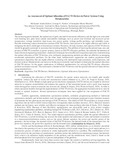| dc.description.abstract | The increasing power demand, the optimal use of grids, the need for economic efficiency, and the high costs associated with building new grids have created unavoidable challenges such as power line overload and excessive power transmission, voltage instability, high losses, low power quality, voltage profile problems, and reliability issues. Flexible alternating current transmission systems (FACTS) devices have proven to be highly effective and viable in mitigating the above challenges in transmission systems. However, the type, location, and capacity of FACTS devices should be properly optimized to maximise their resulting benefits. The problem of knowing the optimal type, size, and position of FACTS controllers in power systems, known as FACTS allocation problem, has attracted the attention of many electrical engineering researchers. Analytical techniques have insufficient computation precision in determining the optimal allocation of FACTS devices, also, arithmetic programming methods are often not effective in managing constrained optimization problems. On the other hand, metaheuristics approaches are random population-based optimization algorithms that are highly effective in dealing with multimodal high constraints, multi-objectives, and discrete systems. Metaheuristics are known to be the most commonly used methods to determine the optimal allocation of FACTS devices. In this paper, applications of different metaheuristics for solving FACTS devices allocation problem are deeply assessed. The assessment is limited to FACTS devices and the optimal allocation of these devices using metaheuristics. | en_US |

